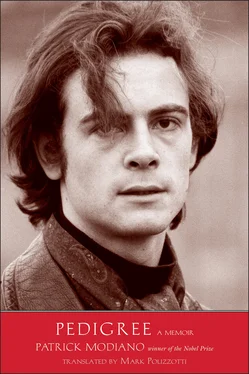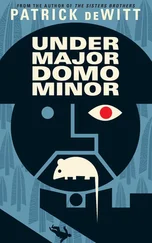My father’s other acquaintances under the Occupation, at least the ones I know about: an Italian banker, Georges Giorgini-Schiff, and his girlfriend, Simone, who would later marry Pierre Foucret, the owner of the Moulin Rouge. Giorgini-Schiff had his offices at 4 Rue de Penthièvre. My father bought a large pink diamond from him, the “Southern Cross,” which he’d try to resell after the war, when he was destitute. Giorgini-Schiff was arrested by the Germans in September 1943, following the Italian armistice. During the Occupation, he had introduced my parents to a Doctor Carl Gerstner, economic adviser at the German embassy, whose girlfriend, Sybil, was Jewish, and who would apparently become a “major” figure in East Berlin after the war. Annet Badel: former attorney, director of the Théâtre du Vieux-Colombier in 1944. My father did some black marketeering with him and his son-in-law, Georges Vikar. Badel had sent my mother a typescript of Sartre’s No Exit , which he planned to stage at the Vieux-Colombier in May 1944, under its initial title, “Other People.” That script of “Other People” was still lying at the back of a wardrobe in my room on the fifth floor of Quai de Conti when I was fifteen. Badel thought my mother kept in touch with the Germans through the Continental Films production company, and that she could help him obtain a censorship visa for the play more quickly.
Other close associates of my father’s: André Camoin, antiques dealer, Quai Voltaire; Maria Chernichev, a daughter of Russian nobility but “déclassée,” with whom he conducted some huge black market deals; and a certain “M. Fouquet,” with whom he conducted more modest ones. This Fouquet had a shop on Rue de Rennes and lived in a small private house in the Paris suburbs.
I close my eyes and I see Lucien P. arriving, with his heavy footstep, from the deepest recesses of the past. I believe his job consisted of acting as middleman and introducing people to one another. He was very fat, and in my childhood, whenever he sat on a chair I was always afraid it would collapse under his weight. When he and my father were young, Lucien P. was the long-suffering lover of the actress Simone Simon, whom he followed around like a big poodle. And also a friend of Sylviane Quimfe, a pool shark and adventuress, who under the Occupation would become the Marquise d’Abrantès and the mistress of one of the Rue Lauriston gang. People on whom you can’t dwell at length. Shady travelers at best, passing through a train station concourse without my ever knowing their final destination, supposing they even had one. To finish with this list of phantoms, I should mention the two brothers, who might have been twins: Ivan and Alexandre S. The latter had a girlfriend, Inka, a Finnish dancer. They must have been real grands seigneurs of the black market, because under the Occupation they celebrated their “first billion” in an apartment in the massive edifice at 1 Avenue Paul-Doumer, where Ivan S. lived. He fled to Spain at the Liberation, as did André Gabison. As for Alexandre S., I wonder what became of him. But is there really any point asking? My heart goes out to those whose faces appeared on the German wanted posters, the “Affiche Rouge.”
Jean de B. and the antiques dealer from Brussels left the apartment on the Quai de Conti in early 1943, and my parents moved in. Before I finally get sick of all this and no longer have the heart or the energy to continue, here are a few more scraps of their life at that distant time, but as they lived it in the chaos of the present.
They sometimes hid out in Ablis, at the Chateau du Bréau, with Henri Lagroua and his girlfriend Denise. The Chateau du Bréau was abandoned. It belonged to some Americans who had fled France because of the war and given them the keys. In the countryside, my mother took motorcycle rides with Lagroua on his 500 cc BSA. She spent the months of July and August 1943 with my father at an inn in Varenne-Saint-Hilaire, the Petit Ritz. Giorgini-Schiff, Simone, Gerstner, and his girlfriend, Sybil, joined them there. Swimming in the Marne. The inn was home to several outlaws and their “wives,” among whom a certain “Didi” and his companion, “Mme Didi.” The men drove away in the morning to attend to their dirty work and returned from Paris very late at night. Once, my parents overheard an argument in the room above theirs. A woman called her man a “lousy cop” and threw wads of cash out the window, berating him for bringing back all that money. Police stooges? Gestapo henchmen? Toddie Werner, aka Mme Sahuque, at whose home my parents had met, barely managed to avoid being picked up at the beginning of 1943. She injured herself jumping from a window of her apartment. There was a warrant out for the arrest of one of my father’s oldest friends, Sacha Gordine, as attested by a memo from the Legal Status Bureau in the General Commissariat for Jewish Affairs to the head of an “Investigation and Verification Division”: “April 6, 1944. Per the above-referenced note, I had requested that you proceed without delay to arrest the Jew Sacha Gordine for infraction of the Law of June 2, 1941. Pursuant to this note, you indicated that this individual had abandoned his present domicile without leaving a forwarding address. However, he has lately been observed riding his bicycle in the streets of Paris. I therefore request that you kindly pay another visit to his domicile so as to follow up on my note of January 25th last.”
I remember that my father mentioned this period, once only, one evening when we were on the Champs-Elysées. He pointed out the end of Rue de Marignan, where they had taken him away in February 1942. And he told me of a second arrest, in the winter of 1943, after “someone” had denounced him. He had been brought to the Depot, from where “someone” had freed him. That evening, I felt that he wanted to unburden himself, but the words wouldn’t come. He said only that the Black Maria had made the rounds of the police stations before reaching the lockup. At one of the stops, a young girl had got on and sat across from him. Much later I tried, in vain, to pick up her trace, not knowing whether it was the evening in 1942 or in 1943.
In the spring of 1944, my father received anonymous telephone calls at the Quai de Conti. A voice addressed him by his real name. One afternoon, when he was out, two French plainclothesmen rang at the door and asked for M. Modiano. My mother told them she was just a young Belgian working at Continental, a German company. She was subletting a room in the apartment from a man named Henri Lagroua and couldn’t help them. They promised to come back. My father, to avoid them, left the Quai de Conti. I imagine these were not members of Schweblin’s Jewish Affairs police but men from the Investigation and Verification Division — as in Sacha Gordine’s case. Or else they were sent by Superintendent Permilleux of the Prefecture. Later, I tried to put faces to all those names, but they remained firmly ensconced in the shadows, with their odor of rotten leather.
My parents resolved to leave Paris as quickly as possible. Christos Bellos, the Greek my mother had met at B.’s, knew a girl who lived on a property near Chinon. The three of them took refuge with her. My mother brought along her winter sportswear, in case they had to flee even farther. They hid in that house in the Touraine until the Liberation and would return to Paris, on bicycles, only when the American troops arrived.
Back in Paris at the beginning of September 1944, my father was hesitant about returning right away to the Quai de Conti, fearing that the police would again be after him — this time because of his illegal activities as a black marketeer. My parents lived in a hotel at the corner of Avenue de Breteuil and Avenue Duquesne, the same Alcyon de Breteuil where my father had already hid out in 1942. He sent my mother on ahead to Quai de Conti to get the lay of the land. She was summoned by the police and subjected to a lengthy interrogation. Since she was a foreigner, they wanted to know the precise reason for her arrival in Paris in 1942 under German patronage. She explained that she was engaged to a Jew with whom she’d been living for two years. The police questioning her were no doubt colleagues of the ones who’d tried to arrest my father under his real name a few months earlier. Or the same ones. They must now have been searching for him through his aliases, unable to identify him.
Читать дальше












